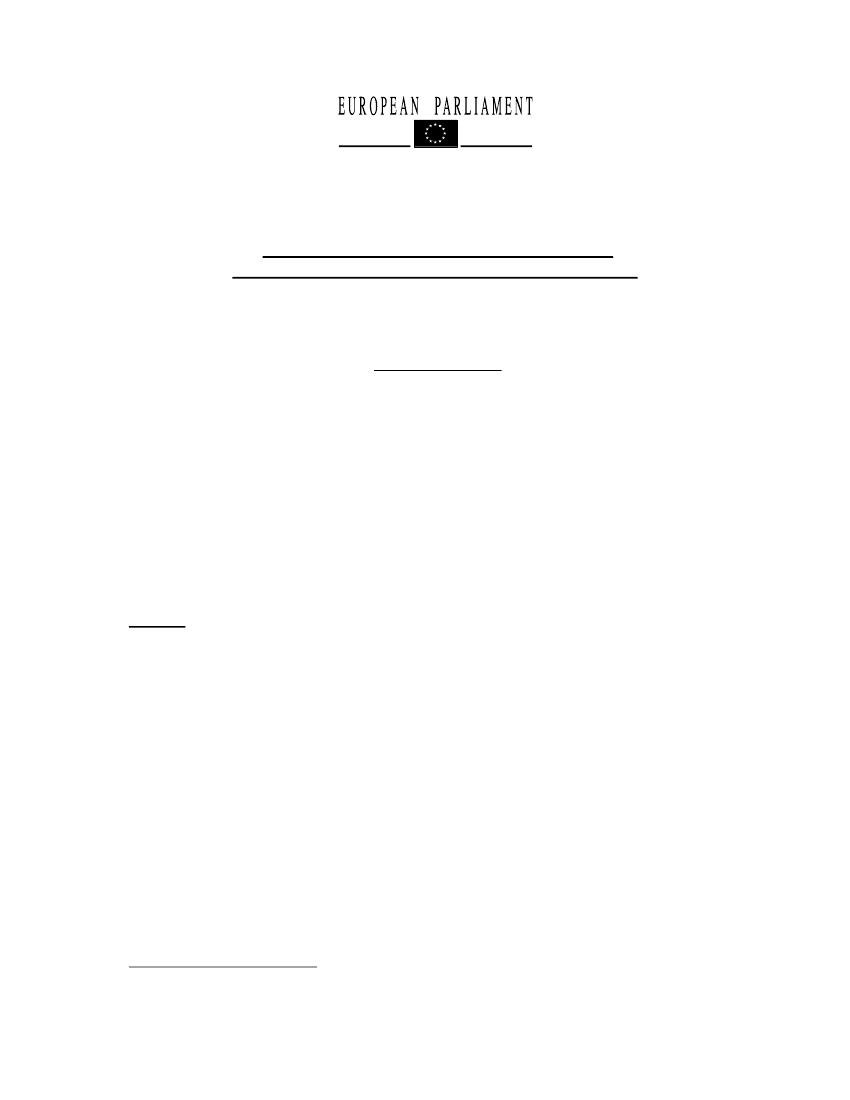Europaudvalget 2008-09
EUU Alm.del
Offentligt
2.1.
RULES GOVERNING THE PAYMENT OFEXPENSES AND ALLOWANCES TO MEMBERS1(updated on 1 February 2009)
CONTENTS
Chapter 1Chapter 2Chapter 3Chapter 4Chapter 5Chapter 6Chapter 7Chapter 8
Travel Expenses .......................................................................................... 2Travel Allowance........................................................................................ 9Subsistence Allowance ............................................................................... 11Other Allowances........................................................................................ 13Insurance Policies and Medical Expenses .................................................. 17Language and Computer Courses ............................................................... 21Accounts and Settlements ........................................................................... 24General and Final Provisions ...................................................................... 26
AnnexesIIIIIIIVVVIVIISurvivor's pension.........................................................................................28Invalidity pension .........................................................................................30Retirement pension .......................................................................................32Implementation of Article 21 (medical expenses)........................................34Rules governing the transitional end-of-service allowance forMembers of the European Parliament ..........................................................41Rules governing the accreditation of assistants and theirwork in the European Parliament (including register of interests) ...............43Rules governing the additional (voluntary) pension scheme.......................45
1
On a proposal from the Quaestors, the Bureau takes an annual decision on the adjustment of Members' expensesand allowances in accordance with the system of annual index-linking. The Bureau took a decision on the 2007adjustment at its meeting of 13 December 2006 (the table is annexed to the minutes of that meeting).
DV\768002EN.doc
PE 113.116/BUR/Rev XXV/01-2009
CHAPTER 1TRAVEL EXPENSES
1.2.3.4.5.6.7.
Meetings of official bodies of the European ParliamentTravel on parliamentary businessMembers of the Bureau and QuaestorsNon-attached MembersLanguage and computer coursesMeans of transport provided by the European ParliamentApplications for reimbursement
Articles 1-4Article 5Article 6Article 7Article 8Article 9Article 9a
Article 1(as amended by Bureau decision of 7 April 2003)1.Members of the European Parliament (hereinafter referred to as ‘Members’) shall beentitled to reimbursement of travel expenses in the form of a lump sum travel allowance inrespect of proven and authorised attendance at meetings of the official bodies of theEuropean Parliament (hereinafter referred to as ‘Parliament’).For the purposes of paragraph 1, the official bodies of Parliament are:(a) the plenary session of Parliament;(b) the Bureau and Conference of Presidents;(c) the Quaestors, the Conference of Committee Chairmen and the Conference ofDelegation Chairmen;(d) the committees and any subcommittee thereof and committees of inquiry set up inaccordance with Chapter XX of the Rules of Procedure;(e) interparliamentary delegations and any delegations set up for the purposes ofconducting the conciliation procedure within the meaning of Rule 56 of the Rules ofProcedure;(f) political groups or their bodies when meeting to prepare for parliamentary sessions orfor official study days;(g) working parties and similar bodies set up by decision of the Bureau.3.The Members defined in the following seven subparagraphs shall, for the purposes ofparagraph 1, be authorised to attend meetings of the official bodies set out in thecorresponding subparagraphs of paragraph 2:(a) all Members elected in accordance with Rule 1 of the Rules of Procedure;(b) members of the Bureau and of the Conference of Presidents as defined in Rules 21and 23 respectively of the Rules of Procedure;(c) Quaestors elected in accordance with Rule 15 of the Rules of Procedure, and membersof the Conference of Committee Chairmen and of the Conference of DelegationChairmen as defined in Rules 26 and 27 of the Rules of Procedure;(d) Members elected in accordance with Rule 177, Members designated in accordancewith Rule 178(1) and (2), and Members attending in accordance with Rule 46(6);(e) Members designated in accordance with Rules 188 and 190 and 56(3) of the Rules ofProcedure;(f) Members belonging to the various political groups formed in accordance with Rule 29of the Rules of Procedure;DV\768002EN.doc2/52PE 113.116/BUR/Rev XXV/01-2009
2.
(g) Members appointed by the Bureau in its decision to set up a working party or similarbody.4.Members duly invited to attend a meeting of an official body shall, for the purposes ofparagraph 1, be authorised to do so.Attendance at the plenary session shall be attested by a signature in the register open in theChamber. Attendance at meetings of the other official bodies shall be attested by theMember's personal signature in an attendance register drawn up by the secretariat of thebody concerned. Attendance within the meaning of Article 5(1) and Article 11(d) shall becertified in the central register referred to in these provisions.By way of exception, attendance of a Member in accordance with this article may beattested by other supporting documents approved by the Quaestors (Bureau decision of23 October 1984)2,3.Article 2– Meetings of official bodies held within the territory of the European Community4(as amended by Bureau decisions of 15 January 1996, 15-16 September 1997,19 October 1998, 12 April 1999 and 12 November 2001)1.In respect of meetings of official bodies held within the territory of the EuropeanCommunity as defined in Article 299 of the Treaty establishing the European Communityand within Europe, the travel allowance referred to in Article 1(1) shall be calculated inaccordance with the mode of transport used and on the basis of the distance travelled by theMember to the venue for the meeting, the point of departure being the Member's place ofresidence as shown in the official list of Members of Parliament and declared to therelevant department of Parliament (hereinafter referred to as the ‘point of departure’).Where a Member makes the journey by air, the lump sum travel allowance shall becalculated on the following basis:
5.
2.
2
3
4
To that end, Members may submit to the Members’ Pay and Allowances Unit, for the attention of the Quaestorresponsible for financial matters, a request justifying their failure to sign the register or an attendance register. Inthe exercise of the powers conferred on them by Article 1(5) and of their responsibility for the interpretation ofthese Rules provided for by Article 29(2) thereof, the Quaestors confirmed, at their meeting of 3 July 2002, that:- the supporting documents within the meaning of Article 1(5) include hotel bills or travel tickets which confirmthat the Member was actually present at the venue for the meeting, and that- the Quaestor responsible for financial matters may authorise the submission of such documents or supportingdocuments on up to five occasions during each period of two and a half years.They also decided that the maximum of five occasions would not be applied in the case of Members who foundthemselves in an objectively established exceptional situation which made it difficult or impossible for them tocomply with the signature requirements.The presence of a Member arriving late on the Monday of a Strasbourg part-session, for duly established reasonsof force majeure in connection with travel difficulties, may be established by the signing of a central registeropen until 22.00 (Bureau decision of 10 April 2000).For detailed implementing rules, see Quaestors' Communication No 9/99 which indicates, inter alia, that aMember who takes the view that the airport selected by the Administration does not enable him or her to reachwithout difficulty one of Parliament's three normal places of work may propose a different airport of departure.Provided that that airport is situated less than 150 km by road from the Member's place of residence, theAdministration will make the change requested. If the airport is situated more than 150 km from the Member'splace of residence, the request will be submitted to the Quaestors for a decision.
DV\768002EN.doc
3/52
PE 113.116/BUR/Rev XXV/01-2009
(a)
an amount equivalent to the normal air fare for the journey between the closestappropriate airport5to the Member's place of residence and the airport serving theplace of work concerned;
(b) an amount representing the airport journey expenses to cover travel between the pointof departure and that airport. This amount shall be calculated on the basis of a singleper-kilometre rate fixed by the Bureau, the minimum reimbursement being EUR 40per return journey;(c)an amount, fixed by the Bureau, per return journey on the basis of the distancebetween the point of departure and the place of work, known as the distanceallowance. This allowance shall aim to take the length and conditions of the journeyinto account.
3.
Where a Member does not travel by air (but rather, for example, by train or private car), thelump sum travel allowance shall be calculated on the following basis:(a)an amount calculated on the basis of two flat rates fixed by the Bureau:- a full rate for the first 500 kilometres of the journey;- a reduced rate for the remainder of the journey;
(b) the distance allowance defined in paragraph 2(c).4.Regardless of the mode of transport used, the various components of the lump sum travelallowance shall be calculated on the basis of the most direct route (or parts thereof) betweenthe Member's point of departure and the venue for the meeting. This point of departure maynot be further away from the venue for the meeting than the place of residence declared bythe Member to Parliament's relevant department.Members requesting payment of the lump sum travel allowance shall be required to submitthe following supporting documents: the boarding card for any journey undertaken by air,the rail ticket for journeys undertaken by train, or a personal declaration that the journeyhas been made for journeys undertaken by private car or any other means of transport.5.6.The minimum payment in respect of the travel allowance shall be EUR 40.The lump sum travel allowance is designed to cover the costs of the entire journey(including, inter alia, ticket reservation fees, luggage charges, hotel expenses, meals andtaxi fares).(a)By way of derogation from paragraph 6, Members not able to use an official car shallbe entitled to reimbursement of taxi fares on presentation of the relevant receipt, dulydated, to the Members' Pay and Allowances Unit in respect of journeys between theairport or railway station of arrival or departure and the actual place of work;
7.
(b) except in respect of journeys between an airport of arrival or departure and a capitalcity, journeys under (a) above shall not exceed 20 kilometres unless authorised by theQuaestors;5
The Member's airport of departure used for calculating the price of the air ticket and the total distance travelledis the closest appropriate airport to the Member's declared place of residence which is able to issue a 'YY -economy class unrestricted normal fare' air ticket between that airport and the airport serving the venue for themeeting of the Parliament body.
DV\768002EN.doc
4/52
PE 113.116/BUR/Rev XXV/01-2009
(c) taxi bills relating to the outward journey for the current working week and the returnjourney for the previous week shall be submitted to the Members’ Pay andAllowances Unit, together with the other supporting documents concerning the week.They shall be incorporated into the pay statement for the week during which thejourneys were made, and payment shall be made on the basis of the samearrangements.8.Where it is established from the official list of Members that a Member's constituency orplace of residence is within the territory of the European Community and outside Europe,that Member's travel expenses shall be reimbursed on the following basis:(a)the return air fare by the most direct route from the constituency or place of residenceto the capital of his or her Member State, on presentation of the relevant ticket to theMembers' Pay and Allowances Unit;
(b) the lump sum travel allowance calculated in accordance with paragraphs 2 and 3, fromthe said capital to the place of the meeting, with calculation of the distance allowanceper return journey on the basis of the distance between the place of residence and theplace of work.
Article 3Meetings of official bodies held outside the territory of the European Community(as amended by Bureau decisions of 11 February 1993, 15 January 1996,15-16 September 1997 and 12 April 1999)In respect of meetings of official bodies held outside the territory of the European Community asdefined in Article 299 of the Treaty establishing the European Community or within the saidterritory and outside Europe, a Member's travel expenses shall be reimbursed on the followingbasis:(a)the lump sum travel allowance calculated in accordance with Article 2(2)(b) in respect ofthe journey between the Member's point of departure and the nearest international airport orthe airport or airports used for taking off and landing by any special aircraft chartered, or byany aircraft on which group travel arrangements have been made, as appropriate;
(b) the return air fare by the most direct route from the appropriate airport to the venue for themeeting, on presentation of the relevant ticket and the boarding card to the Members' Payand Allowances Unit, unless the Member makes use of a special aircraft. The maximumamount refundable shall be the air fare in Club Class (Business Class) for the relevantjourney.
Article 4
(as amended by Bureau decisions of 15-16 September 1997, 14-16 September 1998,12 April 1999 and 3 May 1999)
1.2.
Members shall be entitled to the lump sum travel allowance referred to in Article 1(1) onlyin respect of one return journey per working week.Members who make more than one return journey within a working week shall be entitledto reimbursement of the travel expenses actually incurred in respect of a single additionaljourney. If they submit supporting documents to prove that the journey was connected withtheir political activities, they may likewise be entitled to reimbursement in respect of a5/52PE 113.116/BUR/Rev XXV/01-2009
DV\768002EN.doc
second journey made in the same week. Such expenses shall be reimbursed on the basis ofthe air fare or first-class rail fare, on presentation to the Members' Pay and Allowances Unitof the boarding card and the ticket, for journeys undertaken by air, and the rail ticket, forjourneys undertaken by train. Travel by car shall be reimbursed on the basis of the first-class rail fare, on presentation of a personal declaration that the journey has been made6.By way of derogation from paragraph 1, Members shall receive the lump sum travelallowance for a second return journey within a working week if the amount of thesubsistence allowance to which they would be entitled in respect of intermediate days underArticle 11(1)(b) exceeds the amount of the lump sum travel allowance.3.Members who attend two or more meetings in different venues, or one meeting in twodifferent venues, in the same working week shall, subject to paragraph 4, be entitled toreimbursement of travel expenses calculated in accordance with Article 2(2) and (3) on thebasis of the shortest distance between the two venues7.Members who return to their point of departure between the meetings referred to underparagraph 3 shall be entitled to reimbursement of travel expenses on the more favourable ofthe following two bases:(a)a lump sum travel allowance calculated in accordance with Article 2(2) and (3) on thebasis of the shortest distance between the venues for the two meetings;
4.
(b) the expenses actually incurred in travelling from the venue for the first meeting to thepoint of departure and thence to the venue for the second meeting. Such expensesshall be reimbursed on the basis of the air fare or first-class rail fare, on presentationof the relevant ticket to the Members' Pay and Allowances Unit.Travel by car shall be reimbursed on the basis of the first-class rail fare8.
6
7
8
As regards intermediate journeys by Members elected in the combined region of the South-West electoral regionand Gibraltar, the Quaestors took note at their meeting of 28 September 2006, of the judgment handed down bythe Court of Justice in Case C-145/04 (Spain vUnited Kingdom)allowing residents of Gibraltar to vote inelections to the European Parliament as part of the South-West region and decided consequently that BritishMEPs elected in the combined region of the South-West region and Gibraltar, should be entitled toreimbursement of [expenses incurred in making] intermediate journeys in accordance with the provisions laiddown in Article 4 of the Rules governing the payment of expenses and allowances to Members'.As regards 'triangularjourneys'undertaken by Members on behalf of a political group and in connection withthe performance of their parliamentary duties, see the Bureau decision of 30 November 2005.Example:If a Member resident in London has a meeting in Brussels followed by a meeting in Athens in the sameworking week, he would be entitled to the lump sum travel allowance calculated on the basis of the distance forthe following: London-Brussels-Athens-LondonIf, however, the Member returns to London and then travels directly from London to Athens, he would then beentitled to the more favourable option between:(a)London-Brussels-Athens-London-lump sum rate - and(b)London-Brussels-lump sum rateBrussels-London-Athens-actual costAthens-London-lump sum rate.
DV\768002EN.doc
6/52
PE 113.116/BUR/Rev XXV/01-2009
Article 5
(Bureau decision of 9 July 1987 as amended by Bureau decisions of 15 January1996, 3 December 1997, 23 June 1999 and 10 December 2007)
1.
Except during part-sessions, Members shall be entitled to the reimbursement of travelexpenses arising from a visit to a Community institution (including Parliament) in Brusselsmade in connection with their duties, on the basis of the lump sum travel allowancereferred to in Article 1(1), calculated pursuant to Article 2. A Member's attendance shall beestablished by the signing of the central attendance register9.This entitlement shall also apply to Luxembourg and Strasbourg when official meetings ofParliament are held there, subject to the signing of the central attendance register.
2.
Chairmen of political groups, chairmen of parliamentary committees (or, in either case,their duly authorised representative), vice-chairmen of parliamentary committees, chairmenof interparliamentary delegations (or their duly authorised representative), rapporteursappointed in accordance with Rules 42 and 44 of the Rules of Procedure and draftsmen ofopinions shall be entitled to reimbursement of travel expenses incurred in connection with avisit to a Community institution (including Parliament) in Brussels, Luxembourg orStrasbourg in the performance of their duties on the basis of the lump sum travel allowancereferred to in Article 1(1) calculated in accordance with Article 2. However, on days whenplenary sittings are organised, travel expenses as defined in this Article shall be reimbursedonly where the mission has received prior authorisation from the President or from theBureau of the European Parliament.Members authorised to undertake a mission within the meaning of Rule 179(5) of the Rulesof Procedure shall be entitled to reimbursement of travel expenses on the basis of the lumpsum travel allowance referred to in Article 1(1) calculated in accordance with Article 2 oron the basis of Article 3, according to the place of the mission.Members taking part in official visitors' seminars organised by Parliament in one of itsplaces of work shall be entitled to reimbursement of travel expenses on the basis of thelump sum travel allowance referred to in Article 1(1) calculated in accordance withArticle 2.
3.
4.
Article 6(as amended by Bureau decision of 15 January 1996)Travel expenses incurred by the President on missions in the performance of his or her duties asPresident of Parliament, and by a Vice-President or Quaestor on mission in the performance ofhis or her duties as Vice-President or Quaestor respectively, shall be reimbursed on the basis ofthe lump sum travel allowance referred to in Article 1(1) calculated in accordance with Article 2or on the basis of Article 3, according to the place of the mission. However, on days when9
During the weeks which Parliament's calendar specifically sets aside for external activities, this entitlement shallbe limited to one journey, with no possibility of undertaking an intermediate journey, and expenses shall bereimbursed as follows:a. on the basis of expenses actually incurred if the Member also participates in an external activity taking placewithin the European Union, orb. under the lump sum travel allowance if the Member does not participate in an external activity or alsoparticipates in an external activity outside the European Union.During these weeks, no more than three subsistence allowances may be claimed for days spent in Brussels and nosuch allowance may be claimed for public holidays or office closing days, except in the cases provided for in Article11(1)(d).
DV\768002EN.doc
7/52
PE 113.116/BUR/Rev XXV/01-2009
plenary sittings are organised, travel expenses as defined in this Article shall be reimbursed onlywhere the mission has received prior authorisation from the President or from the Bureau of theEuropean Parliament.
Article 7Non-attached Members shall be entitled to reimbursement of travel expenses on the basis of thelump sum travel allowance referred to in Article 1(1) calculated in accordance with Article 2 inrespect of one journey to Brussels or Luxembourg per month to prepare for the plenary session10.
Article 8(deleted by Bureau decision of 3 May 2004 which came into force on 20 July 2004)
Article 9Without prejudice to Article 2(7), Members may, with the prior authorisation of the President orthe Quaestor duly delegated, have the use of an official Parliament car. Members shall not beentitled to any reimbursement of travel expenses, on the basis of the lump sum travel allowancereferred to in Article 1(1), in respect of any journey or part thereof for which the official car isprovided.
Article 9a(Bureau decision of 12 November 2001)Requests for reimbursement on the basis of Articles 2, 3, 4, 5, 6, 7 and 8 must be submitted tothe Members’ Pay and Allowances Unit no later than 31 October of the calendar year followingthat in which the travel and visits covered by the requests took place.
10
See also Article 12(3).
DV\768002EN.doc
8/52
PE 113.116/BUR/Rev XXV/01-2009
CHAPTER 2TRAVEL ALLOWANCE
Article 10(as amended by Bureau decisions of 13 December 1989, 3 April 1990, 19 November1992, 15-16 September 1997, 12 April 1999, 3 May 1999, 12 November 2001,16 December 2002 and 14 November 2005; for detailed application, see Quaestors’Communication No 1/98)1.Members shall be entitled to an allowance of up to EUR 350011per year, subject to annualindexation12,to meet the expenses incurred in connection with travel undertaken in theperformance of their duties (with the exception of travel within the country in which theywere elected) subject to presentation of supporting documents13,14,15.Payments under this allowance shall be made on the basis of the air fare or rail fare, onpresentation of the boarding card and air ticket, for journeys undertaken by air, and the railticket, for journeys undertaken by train, to the Members' Pay and Allowances Unit. In thecase of journeys undertaken by car, reimbursement shall be based on the first-class railfare, on presentation of a personal declaration that the journey has been made.Additional reimbursement, where appropriate, of expenses incurred in the transportation ofa Member's car by ferry shall be made on presentation of the ticket.Taxi and car rental costs shall be reimbursed on presentation of the original invoice.3.The allowance may also be used to cover hotel bills and other ancillary expenses onpresentation of the original hotel bill.The amount of expenses reimbursed may not, under any circumstances, exceed the actualcosts incurred. Requests for reimbursement must be submitted to the Members' Pay andAllowances Unit no later than 31 October of the calendar year following that in which thetravel and visits covered by the requests took place.Committee and subcommittee chairmen shall receive an annual allowance not exceedingEUR 3 500 per committee or subcommittee, subject to annual indexation, to meet theexpenses incurred in connection with travel undertaken in order to attend conferences orsimilar events which fulfil the following criteria:- the conference in question must relate to a topic which has a European dimension;Bureau decision of 13 December 2000 and European Parliament resolution of 14 December 2000 on the draftgeneral budget of the European Union for the financial year 2001; the amount of EUR 3 500 was applicable witheffect from 1 January 2001.By Bureau decision of 3 December 2008, the travel allowance was set at EUR 4 148 with effect from 1 January2009.In accordance with the Bureau decisions of 12 March 1996, 12 March 2001 and 30 May 2001, the cost oftravel outside the three places of work by parliamentary committee rapporteurs pursuant to Rule 22(8) of theRules of Procedure shall be reimbursed on the basis of the travel allowance referred to here.The travel allowance may not be used for travel by committee delegations (Article 13 of the Bureau decision of11 October 2006 on travel by parliamentary committees outside the three places of work of the EuropeanParliament).For the purposes of the application of this article, journeys undertaken by Members elected in France in theFrench overseas departments and territoriesshall not be regarded as travel within the country in which theywere elected (interpretation adopted by the Quaestors at their meeting of 14 November 2001).
2.
4.
5.
11
12
13
14
15
DV\768002EN.doc
9/52
PE 113.116/BUR/Rev XXV/01-2009
- the conference topic must fall within the remit of the committee or subcommittee of whichthe chairman has been invited to attend;- the conference must have a parliamentary dimension;- attendance must be authorised by the President of the European Parliament, afterverification that the authorised ceiling has not been exceeded.Committee and subcommittee chairmen invited to attend conferences or events which meetthe criteria laid down above may appoint their vice-chairmen to represent them, on conditionthat they provide written authorisation for the allowance allocated to them to be used.The allowance payable to each chairman under this paragraph is separate from the oneprovided for in paragraph 1 above, but use thereof is subject to the same terms forreimbursement as those set out in paragraphs 1 to 4 above16.
16
Paragraph 5 was added by Bureau decision of 14 November 2005.
DV\768002EN.doc
10/52
PE 113.116/BUR/Rev XXV/01-2009
CHAPTER 3SUBSISTENCE ALLOWANCE
Article 11(as amended by Bureau decisions of 15 January 1996, 3 May 1999, 26 September2005 and 28 November 2007)1.Members shall be entitled to a subsistence allowance:(a)(b)(c)for each day on which they are engaged in activities in respect of which the lumpsum travel allowance is payable under Articles 1, 5, 6, 7 and 8;for each intermediate day between any days referred to under (a) within the sameworking week, where they do not return to their point of departure;for each day of proven attendance at meetings of committees and other bodies of anational parliament, to which they have received an official invitation, provided thatthe Member concerned is not also a Member of the national parliament concerned17;for each free Friday and for any public holiday in the middle of the week when theywere already present the previous day in one of the three normal places of work inorder to attend a meeting of one of the official bodies of Parliament as set out inArticle 1; Members' attendance shall be attested by their signature in an attendanceregister18provided for that purpose19.
(d)
A free Friday shall be a Friday when no meeting of one of the official bodies of theEuropean Parliament has been organised in a normal week set aside for meetings.Public holidays which fall on a Friday shall not be classed as free Fridays.2.The standard rate of the subsistence allowance shall be the rate currently fixed by theBureau.Members who, under Rule 147 of the Rules of Procedure, have been excluded from theChamber shall forfeit their entitlement to the subsistence allowance for the duration oftheir exclusion (Bureau decision of 15 January 1985)20.The subsistence allowance shall be reduced by 50% for each day during which a Memberhas been absent for more than half of the roll-call votes taken on the Tuesday, Wednesdayand Thursday of Strasbourg part-sessions and the second day of Brussels part-sessions21.
3.
4.
1718
19
20
21
Article 11(1)(c) as amended by the Bureau decision of 26 September 2005.Members wishing to claim under this provision must sign the attendance register available on working days at:- Brussels: ASP 3 H 336- Luxembourg: Schuman Reception- Strasbourg: WIC, ground floor, room 003(See Quaestors' Communications Nos 8/96 and 7/98).At their meeting of 17 January 2001, and in the light of the duration of part-sessions as a result of the 2001calendar, the Quaestors decided that, pursuant to Article 11(1)(d) of the Rules governing the payment ofexpenses and allowances to Members, an attendance register would be made available to Members present inStrasbourg on a Friday (following a part-session held there) who, for reasons concerning connecting flights oroverland travel connections, are unable to return to their country of residence.Rules 9, 22, 96, 146, 147 and 148 of the Rules of Procedure were amended by a decision adopted in plenarysession on 19 January 2006. By the same decision an Annex XVIa was added to the Rules of Procedure.For detailed application, see Communication No 4/98.
DV\768002EN.doc
11/52
PE 113.116/BUR/Rev XXV/01-2009
Article 12(as amended by Bureau decisions of 10 May 1989, 3 May 1999, 24 October 2001and 12 November 2001)1.For meetings of official bodies and for missions referred to in Articles 5(3) and 6 in respectof which travel expenses are reimbursed on the basis of the lump sum travel allowancereferred to in Article 1(1), calculated in accordance with Article 2, the subsistenceallowance shall be payable at the standard rate.For meetings of official bodies and for missions referred to in Articles 5(3) and 6 in respectof which travel expenses are reimbursed on the basis of the lump sum travel allowancereferred to in Article 1(1), calculated in accordance with Article 3, the subsistenceallowance shall be payable at half the standard rate for the period between the departuretime of the last convenient flight before the beginning of the meeting and the arrival timeof the first convenient flight after the meeting, or between the departure time and thearrival time of the special aircraft chartered by Parliament, as appropriate. During thisperiod, Parliament shall be responsible for the reimbursement of reasonableaccommodation expenses incurred at the venue for the meeting (which shall includebreakfast) or, should exceptional circumstances arise, during the journey itself22.Periods ofmore than 12 hours shall count as a full day. Periods of more than six, but fewer than 12,hours shall count as a half day23.For visits to a Community institution referred to in Articles 5(2) and 7, the subsistenceallowance shall be payable at the standard rate. The Members concerned shall be requiredto inform the Members' Pay and Allowances Unit of the date and duration of the visit tothe Community institution or of the mission.For meetings of committees and other bodies of the national parliaments referred to inArticle 11(1)(c), the subsistence allowance shall be payable at the standard rate onpresentation of the official invitation to the Members' Pay and Allowances Unit (Bureaudecision of 21 May 1985)24.Requests for reimbursement must be submitted to the Members’ Pay and Allowances Unitno later than 31 October of the calendar year following that in which the visit covered bythe request took place25.
2.
3.
4.
5.
2223
24
25
This provision does not apply to expenses incurred in the Member State where a Member was elected.Use of special-rate plane tickets: In cases where, at meetings of official bodies held outside the territory of theEuropean Community as defined in Article 3 of the Rules governing the payment of expenses and allowances toMembers, the work starts or ends no more than 24 hours before or after a weekend, the Member may bring themission forward or extend it to cover the relevant weekend, in order to qualify for the most advantageous fare.The additional daily allowance payable will be calculated accordingly, on condition that the combined cost of theadditional days and the ticket itself does not exceed that of the normal fare.In the event of an ‘IT’ ticket (an inclusive ticket covering air fare, hotel accommodation, etc.) being used, theMember must submit, in addition to the ticket, a formal statement listing the services covered by the ticket,together with the price of those services (interpretation adopted by the Quaestors on 14 November 2001).Prior to the Bureau decision of 3 May 2004 (entry into force: 20 July 2004) the current paragraph 4 was theformer paragraph 5.Prior to the Bureau decision of 3 May 2004 (entry into force: 20 July 2004) the current paragraph 5 was theformer paragraph 6.
DV\768002EN.doc
12/52
PE 113.116/BUR/Rev XXV/01-2009
CHAPTER 4OTHER ALLOWANCES
General expenditure allowance(as amended by Bureau decisions of 3 April 1995, 15 July1996 and 3 May 1999)Article 131.Members shall be entitled to a monthly lump sum allowance at the rate currently fixed bythe Bureau to meet expenditure resulting from their activities in their capacity as Membersnot covered by other allowances under these Rules (hereinafter referred to as the ‘generalexpenditure allowance’).All payments under the general expenditure allowance shall be made directly to theMember concerned.This allowance is intended to cover, inter alia, the following expenses incurred in theMember State of election:--------travel and ancillary expenses,office management and running costs, in particular rent and related charges (heating,lighting, insurance, cleaning),the cost of purchasing or renting office equipment,telephone and postage,the purchase of office supplies,the cost of purchasing books, periodicals and newspapers,the cost of using public data consultation networks,the expenses involved in equipping Members of Parliament with communicationsequipment, for example the purchase or rental of a computer, a modem orcommunications card, a printer, communications, word processing, file managementand spreadsheet, etc. software packages and any other related equipment, and the costof maintaining such equipment,the cost of a subscription to the Internet and to databases,the cost of purchasing, using or maintaining a telecopier.
--
The allowance may not be used to cover personal expenses or to finance subsidies or giftsof a political nature.2.The said allowance shall be payable for the duration of the Member's term of office asdefined in Rule 4(1) of the Rules of Procedure. Where a Member's term of officecommences on or after the sixteenth day of the month, the said entitlement shall be limitedto one half of the said allowance.One half of the said allowance shall also be payable for a period of three months followingthe month in which a Member’s term of office comes to an end26, provided that theMember has served for a period of at least six months and that he or she is not re-elected tothe subsequent Parliament.
3.
26
Whether at the end of the five-year parliamentary term, on death or on resignation.
DV\768002EN.doc
13/52
PE 113.116/BUR/Rev XXV/01-2009
Reimbursement of Parliamentary assistance expenses (allowance paid to individualMembers)(as amended by Bureau decisions of 11 December 1995, 15 January 1996, 6 July 2000,9 February 2004, 3 May 2004, 13 December 2004 and 13 December 2006)
Article 141. a)Members shall be entitled to the reimbursement of expenses arising from the employment
or from the engagement of the services of one or more assistants in accordance with theconditions laid down in the Codex for Parliamentary Assistants27 28..Expenditure incurredin connection with traineeship agreements, as referred to in Part II of the Codex, may alsobe reimbursed.Application for reimbursement2. a. To obtain reimbursement of parliamentary assistance expenses in accordance withparagraph 1, the Member shall submit an application for reimbursement accompanied by acopy of the employment contract concluded between the Member and an assistant, togetherwith, where appropriate, a copy of the contract with a paying agent or a copy of thecontract for the provision of services concluded between the Member and a serviceprovider.b. Where, pursuant to Article 4 of the Codex for Parliamentary Assistants, several Membershave jointly employed or engaged the services of a single assistant, a separate applicationshall be submitted by each Member, giving details of the amounts of all payments.3.The application, signed and dated by the Member, shall be deposited with the managementservice29and processed under the authority of the Quaestors. It shall include the followinginformation:-the attached contract(s) and the type of assistance concerned:-the Member's instructions as to the payments and identification of thebeneficiary/beneficiaries.The Member shall notify to the management service any changes to be made in respect ofthe application for reimbursement and/or to the contract by submitting an application foramendment. He or she shall inform the other contracting party (or parties) thereof.The employment contract5. a. In respect of employment contracts, the Member shall forward to the management service,within three months of the assistant taking up his or her duties, a certificate of theassistant's membership of a social security scheme and, where the national law applicableso provides, a certificate of insurance covering accidents at work, failing which paymentsrelating to the assistant concerned shall be suspended.
4.
27
2829
Existing contracts with service providers not making human resources available to Members may continue to bereimbursed for a transitional period until the end of the current legislative term or until such activities have beencovered under specific rules laid down by the Bureau, in conformity with the current rules.PE 352.685/BUR./FINAL.3-2006-09Directorate-General for Finance: Members' Pay and Allowances Unit.
DV\768002EN.doc
14/52
PE 113.116/BUR/Rev XXV/01-2009
b. In addition, the Member shall, for the period laid down by the applicable nationallegislation and for no less than one year after the end of the parliamentary term, keep a paystatement record book itemising sums paid by way of remuneration and tax and socialsecurity deductions (paid by the employee and the employer).c. Where the Member has contracted a paying agent to handle the administrative managementof contracts, the paying agent shall forward to the Member, at least once a year, as well ason expiry of the contract, statements of the expenditure incurred in respect of salaries,social security contributions, tax payments or any other refundable expenditure. Copies ofthose statements drawn up in accordance with the professional standards laid down by thenational law applicable shall be forwarded to the management service.d. Members may apply for all or part of the parliamentary assistance expenses to be paid to apolitical group in the European Parliament only if the latter acts as a paying agent withinthe meaning of subparagraph 5.c. and provided that an application for reimbursement hasbeen submitted in accordance with paragraphs 2 and 3.Service contract6. a. The service contract may provide for monthly payments being made as advance payments.The invoices or fee statements showing the provision of services and, where appropriate,regularising the advance payments made and determining any outstanding balance, shall bedrawn up, in accordance with the national law applicable, for a period not exceeding 12months. The Member shall keep the invoices or fee statements for the period laid down bythe applicable national legislation and for no less than one year after the end of theparliamentary term.
b. The service provider shall forward to the Member at least once a year, as well as on expiryof the contract, a statement of the amounts invoiced, accompanied by a declarationcertifying that all tax and social security obligations resulting from the applicable nationallegislation are complied with. The Member shall forward a copy of the statement and theaccompanying declaration to the management service, authorising the regularisation of theadvance payments made.
7.
By way of derogation from paragraph 2.a. and from the first indent of paragraph 3, invoicesor fee statements for occasional research, assistance, documentation or consultancy workconnected with a Member's official duties may be reimbursed without submission of a copyof a written contract. Payment shall be made at the request of the Member and onsubmission of original invoices or fee statements, either by transfer to the Member's bankaccount, if the invoices have been duly paid, or directly to the beneficiary's account onbehalf of the Member.
Article 15(as amended by Bureau decisions of 15 July 1996, 1 September 2003, 9 February2004 and 13 December 2004)1.The maximum monthly amount of the reimbursement shall be fixed annually by theBureau.
DV\768002EN.doc
15/52
PE 113.116/BUR/Rev XXV/01-2009
2.
Expenses shall be eligible for reimbursement for the duration of the Member's term ofoffice as defined in Rule 4(1) of the Rules of Procedure. Where a Member's term of officecommences on or after the sixteenth day of the month, the Member's entitlement in respectof that month shall be one half of the amount referred to in paragraph 1.Expenses shall be eligible for reimbursement for a period of three months following themonth in which a Member’s term of office comes to an end30, unless(a)(b)(c)(d)the Member is immediately re-elected to the subsequent Parliament;the Member has served for less than six months before the end of the currentparliamentary term;the assistant concerned is in receipt of other remuneration from any Communityinstitution, orthe assistant is employed by another Member during the period in question.
3.
Should the Member, during this period and despite having taken in good time all thenecessary steps required under the applicable law to terminate the contract on the expiry ofher or his mandate, be legally bound under the relevant employment legislation to paysupplementary expenses over and above the amount corresponding to three months' worthof the maximum reimbursement, such expenses may be reimbursed, in addition to theamount referred to in paragraph 1, upon submission of duly established documentationcertified by the competent national authorities.4.Where a parliamentary assistant directly employed by the Member is absent for a periodexceeding three months, either on maternity leave or on account of serious illness, the partof any costs of replacing him or her, as from the fourth month of absence, not covered bythe employee benefits paid under the relevant national social security scheme, may bereimbursed in addition to the amount referred to in paragraph 1.Members to whom Article 2(8) applies may obtain reimbursement of up to two returneconomy-class air fares per year between their constituency or place of residence and thecapital of their Member State in respect of the travel expenses incurred by an assistantemployed or engaged for the purposes of Article 14, on presentation of the relevant ticketto the management service. Any such reimbursement shall be in addition to the amountreferred to in paragraph 1.
5.
Article 16(deleted by Bureau decision of 13 December 2006)
30
Whether at the end of the five-year parliamentary term, on death or on resignation.
DV\768002EN.doc
16/52
PE 113.116/BUR/Rev XXV/01-2009
CHAPTER 5INSURANCE POLICIES AND MEDICAL EXPENSES
Article 17(as amended by Bureau decision of 27 April 2005)The Secretariat shall contract for the benefit of all Members the insurance cover referred to inArticles 18 to 20:1.insurance against accidents occurring either in the performance of their parliamentaryduties or in private life;life assurance;insurance against theft and loss suffered in the performance of their parliamentary duties,with the exception of the theft or loss of portable computers.
2.3.
All premiums shall be paid by Parliament.
Article 18(as amended by Bureau decision of 3 April 1990)1.The terms of the accident insurance policy shall include:(a) compensation in the event of death amounting to EUR 250 000 and, in the event oftotal permanent disability, to EUR 375 000, with scaled reductions in cases of partialpermanent disability;(b) the cost of medical treatment up to EUR 7 500 per accident.All accidents shall be reported within eight days to the Secretary-General with fullparticulars (date, time, place, causes and circumstances, names of witnesses, etc.); thereport shall be accompanied by a medical certificate.
2.
Article 191.The terms of the life assurance policy shall include a sum of EUR 15 338.7531assured foreach Member, payable either on death or on attainment of 60 years of age, subject to atleast ten years' service as a Member or as soon thereafter as ten years' service has beencompleted.Members leaving Parliament before the policy has matured, and after premiums have beenpaid for at least two years, shall be free to choose between:(a) continuation of the policy up to the date of maturity originally fixed, the premiumspayable by the Member concerned;(b) conversion into a paid-up policy with a reduced sum assured, payment falling due onthe date of maturity originally fixed; or(c) payment of the surrender value.
2.
31
Bureau decision of 4 February 1987.
DV\768002EN.doc
17/52
PE 113.116/BUR/Rev XXV/01-2009
Article 20(as amended by Bureau decisions of 17 July 1997 and 27 April 2005)The terms of the insurance policy against theft and loss shall include:(a)(b)(c)(d)worldwide coverage;a sum insured of EUR 2500 per loss or theft;an EUR 25 excess payable by the Member in the event of a claim;coverage of personal effects with the exception of cash and banknotes.
In the event of theft or loss of money occurring outside Parliament premises and reported to thepolice, cover up to a maximum of EUR 250 shall be provided if other personal effects apart fromthe stolen or lost money have likewise been lost or stolen.All thefts or losses shall be declared within eight days to the Welfare Entitlements and SpecificExpenditure Unit. The declaration must be accompanied by an invoice for the item lost or,failing that, for the replacement item if the value exceeds EUR 619.74.
Article 20a: Theft of portable computers(Bureau decision of 27 April 2005)The European Parliament shall reimburse Members in the event of the theft of private portablecomputers used by them in the performance of their parliamentary duties, provided that:(a) an application for insurance, together with a copy of the relevant invoice, has beenforwarded in advance to the management service;(b) the Member forwards a copy of the declaration of theft drawn up by the police authoritiesor, if the theft occurred on the premises of the European Parliament, by the Security Unit;(c) the theft was committed in aggravating circumstances, i.e. burglary, use of false or stolenkeys, violence or threats;(d) the application for reimbursement is submitted to the management service within two weeksafter the theft.The maximum reimbursement shall be EUR 2 500 per Member and the excess for each loss shallbe EUR 250.The amount reimbursed shall take account of the annual 25% depreciation applied to computerequipment pursuant to Commission Regulation (EC) No 2909/2000 of 29 December 2000 on theaccounting management of the European Communities' non-financial fixed assets32.
32
OJ L 336, 30.12.2000, p. 75.
DV\768002EN.doc
18/52
PE 113.116/BUR/Rev XXV/01-2009
Article 21
(See Annex IV) (Bureau decision of 24 September 1986 as amended by Bureaudecisions of 12 December 1990, 15 April 1996, 14 December 1998, 5 September2005 and 1 February 2006)33
1.
Subject to paragraphs 2, 3 and 4, Members, their spouses or stable non-marital partners asdefined in Article 1(2)(c i, ii, iii) of Annex VII to the Staff Regulations of officials of theEuropean Communities34and their dependent children35shall be entitled to reimbursementof medical expenses as follows:(a)(b)in respect of medical expenses actually incurred (i.e. costs of medical consultations,medical treatment, medical prescriptions, hospital charges), full reimbursement;in respect of related expenses (e.g. cost of post-operative or treatment therapy,convalescent or thermal cures, medical aids supplied on prescription, such asspectacle frames and lenses, dental prostheses, etc.), reimbursement in full up to theceiling and in accordance with the conditions laid down for similar expenses in theJoint Sickness Insurance Scheme for officials of the European Communityinstitutions.
2.
Reimbursement shall be made only after presentation of the relevant invoice, duly paid andreceipted and, where appropriate, other supporting documents and shall be limited to thosesums, if any, which are not recoverable under any national or other sickness insurancescheme.Reimbursement by Parliament shall be limited to 80% of the expenses incurred (subject tothe provisions of paragraph 1(b)).Where a national or any possible alternative sickness insurance scheme exists, Members,their spouses36and dependent children37who are eligible to participate therein, but do notdo so, shall not be entitled to reimbursement under paragraph 1.The amount reimbursed per insured person38per year shall not exceed EUR 30 000.Any dispute arising out of the interpretation of this Article in specific cases, with particularregard to paragraph 1(b), shall be referred to the Quaestors for a decision.
3.
4.5.
3334
35
363738
See also Communication to Members No 40/05.Stable non-marital partners are treated in the same way as spouses provided that:(i) the couple produces a legal document recognised as such by a Member State, or any competent authority of aMember State, acknowledging their status as non-marital partners;(ii) neither partner is in a marital relationship or in another non-marital partnership;(iii) the partners are not related in any of the following ways: parent, child, grandparent, grandchild, brother,sister, aunt, uncle, nephew, niece, son-in-law, daughter-in-law;(iv) the couple has no access to legal marriage in a Member State; a couple shall be considered to have access tolegal marriage for the purposes of this point only where the members of the couple meet all the conditions laiddown by the legislation of a Member State permitting marriage of such a couple.For the purposes of these Rules and the Annexes hereto, 'dependent child' means the legitimate, natural oradopted child of a Member, or Member's spouse, who is actually being maintained by the Member if the child isunder 18 years of age or is between 18 and 26 years of age and is receiving educational or vocational training.See the corresponding footnote to Article 21(1).See the corresponding footnote to Article 21(1).At its meeting of 1 February 2006 the Bureau amended the wording of the first sentence and abolished theEUR 30 threshold for the reimbursement of medical expenses to take account of the lower medical fees chargedin the new Member States.
DV\768002EN.doc
19/52
PE 113.116/BUR/Rev XXV/01-2009
Article 21a(Bureau decision of 5 November 2003)The Quaestors may authorise, on a proposal of the Secretary-General, that the EuropeanParliament assumes the costs arising from additional assistance to a seriously disabled Member.The degree of disability and the appropriateness of the facilities proposed so as to enable theMember to carry out his or her duties shall require periodic confirmation by Parliament’sMedical Officer.Article 21b(Bureau decisions of 7 and 9 March 2005 and 3 April 200639)1.In cases where(a)(b)(c)a Member has a seriously disabled dependent child andprofessional assistance needs to be provided to that child in order to enable theMember to carry out his or her duties andno appropriate public social assistance is available to that child under nationallaw,
the Quaestors may decide, on a proposal from the Secretary-General, that the EuropeanParliament should contribute to the financing of the non-medical expenses arising fromthat assistance to the extent that it is not covered by public social security schemes orsupplementary private insurance.2.The degree of disability and the objective necessity of the assistance shall be assessed byParliament's Medical Officer.The Member in question shall submit all requisite evidence concerning the degree ofdisability and shall prove that the cost of the assistance is not reimbursed by any othersocial security scheme or supplementary private insurance.The Member shall contribute to the payment of these expenses in accordance with thedecision of the Quaestors, which shall duly take into account the provisions applicable toofficials of the European Communities.
3.
4.
39
At their meeting of 3 April 2006 the Quaestors decided that Article 21b enters into force retroactively at thebeginning of the parliamentary term 20 July 2004.
DV\768002EN.doc
20/52
PE 113.116/BUR/Rev XXV/01-2009
CHAPTER 6LANGUAGE AND COMPUTER COURSES40
Article 221.Members shall be entitled to the reimbursement of expenditure actually incurred in theirattendance at language or computer courses taught by approved establishments inaccordance with the conditions laid down in this Chapter.'Approved establishment' shall mean a school or institute or self-employed teacher/trainerwho holds the qualifications required by national law applicable to the courses given forthe teaching of the language or the software application in accordance with thearrangements selected by the Member.
2.
Article 22a: Language courses1.Language courses organised by the European Parliament
During part-sessions held in Strasbourg and Brussels, Members may attend, at their request andwithin the limit referred to in Article 22d(1), one or more language courses in accordance with atimetable agreed with the teachers provided for them by the European Parliament on its premisesfor the five most-requested working languages (English, French, German, Italian and Spanish).2.a.Courses in the official languagesMembers may attend courses in the official languages referred to in Rule 138 ofParliament's Rules of Procedure, the languages in which authentic versions of the treatiesare drawn up and the official languages of the officially recognised applicant countries.Members shall receive reimbursement in respect of the tuition fees paid for such courses.b.Members may also receive reimbursement in respect of the travel and subsistenceallowances laid down in Article 22e below if they attend a course in a language school orinstitute situated on the European territory (excluding regions situated outside theEuropean continent and the normal places of work of Parliament):either of a Member State - other than the one in which they were elected - or ofan officially recognised applicant country where the language studied is anofficial language of that country and provided that the courses include aminimum of four hours' tuition per day and last for at least five consecutivedays41;ii.or of a Member State or of an officially recognised applicant country of theirchoice where the course is organised as a ‘total immersion’ course, duly certifiedby the approved establishment.Courses in other languagesAt its meeting of 3 May 2004 the Bureau adopted a new version of Article 22 et seq. of these Rules, whichentered into force on 20 July 2004.The five days may be interrupted for a maximum of two public holidays when the teaching establishment isclosed.
i.
3.40
41
DV\768002EN.doc
21/52
PE 113.116/BUR/Rev XXV/01-2009
Members may attend courses in languages other than those referred to in paragraph 2 above,provided that the languages have a direct connection with their official duties and that theMember receives prior authorisation from the Quaestor responsible for professional training.Members shall receive reimbursement solely in respect of the tuition fees for such courses.
Article 22b: Computer courses1.Members may attend computer courses organised by Parliament for the application of thesoftware that it provides for Members.Members shall receive no reimbursement in respect of attendance at such courses.2.Members may attend courses given outside Parliament for the application of software thatthey use in the exercise of their duties.Members shall receive reimbursement solely in respect of the tuition fees for such courses.Article 22c: Distance-learning and self-tuition42Members may take distance-learning language or computer courses, including online courses, orpurchase self-tuition materials required in connection with language or computer courses.With respect to such courses, Members shall receive reimbursement in respect of the distance-learning registration fees and/or the cost of the teaching materials or software purchased. Thecost of internet connection and use shall not be reimbursed.Article 22d: Reimbursement of tuition fees431.Reimbursement of tuition fees may not exceed EUR 5000 in respect of language coursesand EUR 1500 in respect of computer courses in any one year. Within those limits, amaximum of EUR 500 may be reimbursed in respect of distance learning or self-tuitionmaterials.In an election year, the maximum amounts shall be allocated on a pro rata basis betweenthe outgoing Member and the newly elected Member.2.Tuition fees shall be reimbursed on the basis of a written request from the Member,which must be accompanied by the following supporting documents44:a.the invoice relating to the tuition fees, drawn up in due form and duly receipted inrespect of the total amount, and statingi.the Member’s name,
4243
Modified by the Bureau decision of 8 October 2008Modified by the Bureau decision of 8 October 200844At their meeting of 7 June 2006 the Quaestors decided that if an invoice is issued by an intermediary third party, itmust distinguish between tuition fees and other charges and that proof of payment to the authorised establishmentmust be attached to the invoice along with a certificate of regular attendance issued by this establishment.
DV\768002EN.doc
22/52
PE 113.116/BUR/Rev XXV/01-2009
b.
the name, address and legal status of the approved establishment,the total cost of the course and a breakdown of the cost which shows theprovision of any transport, accommodation or meals included in the totalcost,iv. where appropriate and where required by law, the VAT number and thecommercial register number of the approved establishment;a certificate of regular attendance stating the number of hours of tuition attendedand the dates and times thereof.
ii.iii.
3.
The costs incurred in distance learning or in the purchase of self-tuition materials shall bereimbursed on the basis of a written request from the Member, which must beaccompanied by:a.the invoice, drawn up in due form and duly receipted for the full amount, statingthe name of the Member and the total cost of the registration fee for the distancelearning course and/or the type of teaching material or software purchased;detailed documentation relating to the programme selected or a description of thematerial purchased;and, in the case of online courses, proof of participation specifying the number oflessons taken and the dates and times thereof.
b.c.
Article 22e: Reimbursement of travel and subsistence expenses1.Members attending the language courses referred to in Article 22a(2)(b) shall be entitledto:a.reimbursement of expenditure actually incurred in a maximum of two returnjourneys per year;b.a subsistence allowance at half the standard rate and for a maximum of 20 daysper year, provided that the Member can prove that he or she actually had to bearthe cost of accommodation.The reimbursement shall be made:a.b.in respect of air travel, on the basis of the economy-class air fare and according tothe most direct route, on presentation of the air ticket and boarding cards;in respect of travel by train or boat, including, where appropriate, supplementsactually paid (for example: sleepers, couchettes, cabins, etc.), on presentation ofthe original supporting documents;in respect of travel by private car, on presentation of a written declarationspecifying the actual distance covered: reimbursement on the basis of the first-class rail fare (or, where appropriate, coach fare);in respect of travel by taxi, on presentation of the original supporting documentsspecifying the distance travelled, in respect of journeys not exceeding 40 kmmade on arrival at or departure from the place where the course is held;in respect of the subsistence allowance, on presentation by the Member of aninvoice which proves that the Member actually bore the cost of accommodation.
2.
c.
d.
e.
3.
The supporting documents must be presented together with those relating to tuition fees.
DV\768002EN.doc
23/52
PE 113.116/BUR/Rev XXV/01-2009
CHAPTER 7ACCOUNTS AND SETTLEMENTS
Article 23(as amended by Bureau decisions of 16 September 1998, 3 May 1999 and 13 January2003)1.Sums due to Members in respect of the general expenditure allowance under Article 13shall be paid by way of bank transfer on the first day of the month in question to a bankaccount in a Member State of the Community.Sums due in respect of the parliamentary assistance allowance shall be paid in accordancewith Article 14 by way of bank transfer on the fifteenth day of the month in question to abank account (or bank accounts) specified by the Member in the Member State in whichthe assistant concerned mainly carries out his/her work or in the Member State in whichthe social security contributions must be paid or in the Member State to whose law thecontract is subject.Sums due to Members in respect of other allowances and the reimbursement of expensesunder these Rules shall be paid by bank transfer to a bank account in a Member State of theCommunity.
2.
3.
Article 241.Where payments are to be made by bank transfer, Members shall, on commencement oftheir term of office, provide the Secretary-General with the following information:(a) the name(s) and address(es) of a bank or banks in one or more Member States intowhich Parliament shall pay any sums due to the Member;(b) the name and number of the personal accounts held in the bank(s) nominated under(a).Until the Secretary-General receives the information required under paragraph 1, nopayments may be made to the Member concerned.Members wishing to amend any of the information supplied under paragraph 1 shall notifyany such amendment in writing to the Secretary-General.
2.
3.
Article 25
(as amended by Bureau decisions of 14-16 September 1998, 12 April 1999 and3 May 1999)
1.
Members purchasing from the European Parliament Travel Office tickets for private travelor for official European Parliament journeys in the European Community (covered by thelump sum travel allowance) shall be required to pay for their tickets as soon as they receivethem.If a ticket for an official journey outside the European Community is issued to a Memberby the European Parliament Travel Office, the Member concerned, if he or she does notpay for it by other means, shall sign an acknowledgement of receipt.
2.
DV\768002EN.doc
24/52
PE 113.116/BUR/Rev XXV/01-2009
Article 26(as amended by Bureau decisions of 10 May 1989, 15 January 1996, 16 September1998, 3 May 1999, 13 January 2003 and 30 November 2005)1.(a)Payments by bank transfer made to a Member State in the euro area shall bedenominated in euros; payments by bank transfer made to a Member State which isnot part of the euro area shall be denominated in euros or in the currency of theMember State concerned;(b) for Members participating in official delegations of the European Parliamentmeeting outside the Community, payments by way of advances in respect of hotelexpenses and of the subsistence allowance may be made by bank transfer in eurosor in the currency of a Member State outside the euro zone.In the case of meetings outside the Community attended by a large number ofMembers, such as the annual meeting of the ACP-EU Joint ParliamentaryAssembly, the Secretary-General may authorise specific arrangements for thepayment of advances.2.Where payments under paragraph 1 are denominated in euros, the conversion rate from theeuro to the appropriate national currency shall be:(a)for the travel expenses provided for under Chapter I and the subsistence allowanceprovided for under Article 11, the rate for the penultimate working day of the month,as published in the Official Journal of the European Union; this rate shall apply fromthe first Monday of the following monthfor the general expenditure allowance provided for under Article 13 and thereimbursement of parliamentary assistance expenses provided for under Article 14,the rate applying on the penultimate working day of November of the year precedingthe year in question, as published in the Official Journal of the European Union.
(b)
Nevertheless, for each five-year parliamentary term, in the case of the reimbursement ofparliamentary assistance expenses provided for under Article 14, where the application ofthe rate referred to above results, after applying the annual indexation and any possibleincrease decided by the Bureau, in an amount denominated in national currency which isless than the amount paid during the previous year, the rate to be applied shall be the onethat allows exactly the same amount to be paid in national currency as in the previous year.For the purposes of this rule, the amount to be considered shall be the equivalent value ofthe maximum monthly amount, fixed in accordance with Article 15(1), expressed in termsof the appropriate national currency on the basis of the conversion rate applied pursuant toArticle 26(2)(b) for each year in question45.
45
Article 26(2)(b) and the last subparagraph of paragraph 2 as amended by Bureau decision of 30 November 2005.
DV\768002EN.doc
25/52
PE 113.116/BUR/Rev XXV/01-2009
CHAPTER 8GENERAL AND FINAL PROVISIONS
Article 27(as amended by Bureau decisions of 16 February 1998 and 12 February 2003)1.On commencement of their term of office, Members shall receive a copy of these Rulesfrom the Secretary-General and shall acknowledge receipt thereof in writing.Any Member who considers that these Rules have been incorrectly applied may write tothe Secretary-General. In the event that no agreement is reached between the Member andthe Secretary-General, the matter shall be referred to the Quaestors, who shall take adecision after consulting the Secretary-General. The Quaestors may also consult thePresident and/or the Bureau.Where the Secretary-General, in consultation with the Quaestors, is satisfied that unduesums have been paid by way of allowances provided for Members by these Rules, he shallgive instructions for the recovery of such sums from the Member concerned.In exceptional cases, and on a proposal submitted by the Secretary-General after consultingthe Quaestors, the Bureau may, in accordance with Article 73 of the Financial Regulationand its implementing rules, instruct the Secretary-General temporarily to suspend thepayment of parliamentary allowances until the Member has repaid the sums improperlyused.The Bureau’s decision shall be taken with due regard for the effective exercise of theMember’s duties and the proper functioning of the Institution, the views of the Memberconcerned having been heard before the adoption of the said decision.
2.
3.
4.
Article 28(Bureau decision of 12 November 1986 as amended by Bureau decisions of15 January 1996, 12 May 1997 and 2 May 2001)1.Any Member who, in a parliamentary year (from 1 September to 31 August), is absent onat least 50% of those days fixed by the Bureau for plenary sessions of Parliament shallreimburse to Parliament 50% of the general expenditure allowance, as provided for underArticle 13, relating to that period.Any period of absence referred to in paragraph 1 may be excused by the President on thegrounds of ill-health or serious family circumstances46, or the presence of the Memberconcerned elsewhere on mission on behalf of Parliament. Supporting documents shall besubmitted to the Quaestors within a maximum of two months from the date on which theabsence began.Pending the adoption of a Statute for Members, a Member expecting a child shall beexcused attendance at official meetings of Parliament for a period of three monthspreceding the birth of a child. The Member must submit a medical certificate indicating theprobable date of confinement. After confinement, the Member shall be excused attendanceHospitalisation of a Member's spouse is to be regarded as a serious family circumstance within the meaning ofArticle 28 (interpretation adopted by the Quaestors at their meeting of 14 March 2001).
2.
3.
46
DV\768002EN.doc
26/52
PE 113.116/BUR/Rev XXV/01-2009
at official meetings for a period of six months. The Member must submit a copy of thechild's birth certificate.
Article 291.2.These Rules shall enter into force on 1 January 198447.In accordance with the instructions issued by the President, the Quaestors and theSecretary-General shall be responsible for their interpretation and proper implementation.
- oo0oo -
47
Article 29(1) applies only to the first version of these Rules. The successive amendments entered into force on theday of their adoption by the Bureau, save where the relevant decisions stipulated otherwise.
DV\768002EN.doc
27/52
PE 113.116/BUR/Rev XXV/01-2009
Annex ISURVIVOR’S PENSION(text as amended by the Bureau on13 December 1988, 10 July 1990, 10 July 1995 and 5 September 2005)
Article 1 (as amended by Bureau decision of 5 September 2005)Pending the establishment of a Community salary and pensions scheme for Members, thesurviving spouse or surviving stable non-marital partner as defined in Article 1(2)(c) of AnnexVII to the Staff Regulations of officials of the European Communities and the dependentchildren48of a Member who dies during his or her term of office or while in receipt of theinvalidity pension referred to in Annex II hereafter shall be entitled, respectively, to a survivor'spension and an orphan's pension.
Article 2The amount of these pensions shall be equal to a percentage of the basic salary of a Judge at theCourt of Justice of the European Communities, i.e.:-for the surviving spouseor surviving stable non-marital partnerfor each dependent child49wherethe mother or father is still alivefor each child who has lost both parents
25%
-
5%10%
-
Article 3 (as amended by Bureau decision of 5 September 2005)The amount of all pensions shall be expressed in euros.No weightings shall be applied to pensions which came into effect after 1 May 2004.Pensions granted before 1 May 2004 in respect of which a weighting above 100 was appliedshall be subject, from 1 May 2004 to 1 May 2009, to a transitional weighting, calculated inaccordance with Article 20(2) of Annex XIII to the Staff Regulations of officials of the EuropeanCommunities.
Article 4 (as amended by Bureau decision of 5 September 2005)The gross amount of the survivor's and/or orphan's pension which may be claimed on the same
4849
See the corresponding footnote to Article 21(1) of these Rules.See the corresponding footnote to Article 21(1) of these Rules.
DV\768002EN.doc
28/52
PE 113.116/BUR/Rev XXV/01-2009
grounds50from the national authorities by the spouse or stable non-marital partner as defined inArticle 1(2)(c) of Annex VII to the Staff Regulations of officials of the European Communitiesand/or dependent children51of a Member who dies during his or her term of office shall bededucted from the amount calculated in accordance with Article 2.
Article 5When the definitive Community scheme enters into force, the benefits referred to above shall bereplaced by similar benefits laid down in the definitive scheme, even if the latter are lower.
50
51
Refers to the amount of the survivor's and/or orphan’s pension due from the national authorities solely in respectof the holding of the office of Member of the European Parliament (interpretation adopted by the Quaestors attheir meeting of 12 December 2001).See the corresponding footnote to Article 21(1) of these Rules.
DV\768002EN.doc
29/52
PE 113.116/BUR/Rev XXV/01-2009
Annex II
INVALIDITY PENSION(Bureau decision of 24-25 May 1982 setting up a provisional invalidity pension scheme,as amended on 14 May 1992, 3 April 1995 and 5 September 2005)
Article 1A Member who is recognised by the Invalidity Committee referred to in Article 6 below assuffering from total disability which prevents him or her from performing his or her duties andwho consequently resigns his or her seat in Parliament shall be entitled from the first day of themonth following his or her resignation to the following benefits:(a)where disability is recognised as permanent, he or she shall be entitled to a pension for lifewhich shall be equal to 30% of the basic salary of a Judge at the Court of Justice of theEuropean Communities; for each dependent child52,the pension paid shall be increased byan amount equal to 5% of the basic salary referred to above;where disability is temporary, and until he or she recovers, he or she shall be entitled to thepension(s) referred to in paragraph (a).
(b)
Article 2Payments received:(a)(b)(c)by way of a national invalidity pension;by way of a retirement pension paid pursuant to Annex III to these Rules or a nationalretirement pension paid to former Members;for the performance of duties remunerated from public funds;
shall be deducted from the amount of the invalidity pension.
Article 3A former Member who no longer fulfils the conditions set out in Article 1 shall lose his or herentitlement to an invalidity pension.
Article 4 (as amended by Bureau decision of 5 September 2005)The amount of all pensions shall be expressed in euros.No weightings shall be applied to pensions which came into effect after 1 May 2004.Pensions granted before 1 May 2004 in respect of which a weighting above 100 was appliedshall be subject, from 1 May 2004 to 1 May 2009, to a transitional weighting, calculated inaccordance with Article 20(2) of Annex XIII to the Staff Regulations of officials of the EuropeanCommunities.52
See the corresponding footnote to Article 21(1) of these Rules.
DV\768002EN.doc
30/52
PE 113.116/BUR/Rev XXV/01-2009
Article 5Appropriations for the payment of invalidity pensions shall be entered in the EuropeanParliament’s budget.
Article 6The Invalidity Committee shall consist of three doctors, appointed as follows:---the first, by the Member concerned;the second, by the Institution;the third, by the joint agreement of the two doctors thus appointed.
Article 7When the definitive Community scheme enters into force, the benefits granted in accordancewith the above decision shall be replaced by similar benefits laid down in the definitive scheme,even if the latter are lower.
DV\768002EN.doc
31/52
PE 113.116/BUR/Rev XXV/01-2009
Annex IIIRETIREMENT PENSION(Enlarged Bureau decision of 4 November 1981;Bureau decision of 24 and 25 May 1982, as amended on 13 September 1995 and 6 June 2005)
Article 11.2.All Members of the European Parliament shall be entitled to a retirement pension.Pending the establishment of a definitive Community pension scheme for all Members ofthe European Parliament, where no pension is provided under national arrangements orwhere the level and/or conditions of such pension are not identical to those applicable toMembers of the national parliament of the Member State for which the Member waselected, a provisional pension shall, at the request of the Member concerned, be paid fromthe European Union budget, Parliament Section.
Article 2 (as amended by Bureau decision of 6 June 2005)1.The level and conditions of such pension shall be identical to those applicable to thepension for Members of the lower house of the parliament of the Member State for whichthe Member of the European Parliament was elected.A Member benefiting under Article 1(2) shall be required, when joining the scheme, to payto the European Union budget a sum so calculated that he or she pays the same overallcontribution as that payable by a Member of his or her parliament under nationalprovisions.
2.
Article 3 (as amended by Bureau decision of 6 June 2005)531.Applications to join this provisional pension scheme must be submitted within 12 monthsof the beginning of the Member's term of office.Once that time-limit has expired, membership of the pension scheme shall take effect fromthe first day of the month in which the application was received.2.Applications for payment of the pension must be made within six months of thecommencement of entitlement.Once that time-limit has expired, the pension shall be payable from the first day of themonth in which the application was received.
53
See also the Quaestors' Communication to Members No 30/05.
DV\768002EN.doc
32/52
PE 113.116/BUR/Rev XXV/01-2009
Article 4For the calculation of the amount of the pension, any period of service in the parliament of aMember State may be aggregated with the period of service in the European Parliament. Anyperiod during which a Member has a dual mandate shall count only as a single period.
Article 5These rules shall enter into force on the date of their adoption by the Bureau.[transitional provision no longer applicable]
DV\768002EN.doc
33/52
PE 113.116/BUR/Rev XXV/01-2009
Annex IVIMPLEMENTATION OF ARTICLE 21 (MEDICAL EXPENSES)OF THE RULES GOVERNING THE PAYMENT OFEXPENSES AND ALLOWANCES TO MEMBERS OF THE EUROPEANPARLIAMENT(Bureau decision of 24 September 1986, as amended by Bureau decisions of 12 December 1990,15 April 1996 and 17 July 1997 and 12 November 2007)TITLE 1 - DEFINITIONS1.'Medical expenses', as provided for in Article 21(1)(a), shall cover:- consultations and visits,- surgical treatment,- hospitalisation,- radiology, analyses,- dental treatment,- pharmaceutical products on medical prescription.'Ancillary medical expenses', as provided for in Article 21(1)(b), shall cover in particular:(a) dental treatment and prostheses,(b) miscellaneous physiotherapy and kinesitherapy treatments and similar treatments(c) prothesis, orthopaedic appliances, and other medical equipment(d) treatment by medical auxiliaries and services associated with dependence,(e) cures(f) confinements and treatments for infertility,(g) transport costs.A medical prescription or report is required for all the treatments listed above with theexception of those referred to in point (a).3.A Member shall be required firstly to obtain reimbursement under a national or any otherinsurance scheme before applying to the European Parliament for reimbursement.Reimbursement, therefore, shall be made only:- upon presentation of written evidence of the amount received under a national or otherscheme;- upon presentation of the relevant invoice, duly paid and accompanied by proof ofpayment.Where a Member, his or her spouse or stable non-marital partner54or a dependent child55,eligible to benefit from free health care provided by the State in which the Memberconcerned is elected, chooses not to benefit from the free services, or where the treatmentfacilities chosen (e.g. private hospital, clinic), are not reimbursed under a nationalinsurance scheme, the reimbursement shall be limited to 80% (subject to Article 21(1)(b))of the expenses incurred.Applications for the reimbursement of medical expenses must, except in proven cases of
2.
4.
5.
5455
See footnote 34 to Article 21(1) of these RulesSee footnote 35 to Article 21(1) of these Rules.
DV\768002EN.doc
34/52
PE 113.116/BUR/Rev XXV/01-2009
force majeure, be submitted, using the 'Claim for reimbursement' form56, duly completedand signed, within 18 months following the date of the service. They must be submittedtogether with the following:(a) a copy of the invoice, together with proof of payment and a document showing theamount reimbursed by the national scheme, or(b) if no reimbursement is obtained from the national scheme, the original invoice, togetherwith proof of payment.6.Medical invoices must be detailed in such a way as to allow identification of the servicesand the reimbursement thereof in accordance with the Rules.They must conform to the legislation id the country of issue and include the followingparticulars:- full name of patient- nature of medical treatment(s),- date of, and fees paid for, each medical treatment,- name and official references of the health care provider.- ooOoo -TITLE IIMain terms of the JSIS applicable by analogy to the reimbursement of ancillary medicalexpenses under Article 21(1)(b) of these Rules
I.
DENTAL TREATMENT AND PROSTHESES
1. Periodontal treatmentThe costs of periodontal treatment shall be reimbursed up to a ceiling of EUR 350 per sextant,i.e. EUR 2 100 for the whole mouth, over a period of 10 years. A second reimbursement maybe authorised under the same conditions once 6 years have elapsed after the end of the 10-yearperiod.2. Orthodontic treatmentThe costs of orthodontic treatment (dentofacial orthopaedics) shall be reimbursed up to aceiling of EUR 3 300 for the entire course of treatment.Orthodontic treatment must start before the patient’s 18th birthday, except in the case ofserious buccal cavity disease, maxillofacial surgery, maxillofacial trauma, or serioustemporomandibular joint problems diagnosed by x-ray and clinical examination.3. Dental occlusionThe costs of treating dental occlusion (bite) problems shall be reimbursed up to a ceiling ofEUR 450 for the entire course of treatment. Such treatment, which shall be reimbursable onceonly, comprises• the preliminary study, excluding x-rays;56
Available on Parliament's Intranet site
DV\768002EN.doc
35/52
PE 113.116/BUR/Rev XXV/01-2009
• occlusal splint/night guard;• check-ups on the appliance;• occlusal equilibration sessions.4. Dental prosthesesThe costs of dental prostheses shall be reimbursed up to the maximum reimbursable amountslaid down in the table below. Authorisation to replace removable or fixed prostheses for whichreimbursement has already been obtained may be granted only after a period of 6 years. Thereimbursement will be made in accordance with the conditions set out above.Type of treatment1.a. Fixed prosthesesGold or ceramic inlay, inlay coreCast crown, telescopic crown, ceramo-metallic crown orelement, ceramic facetAttachment (Dolder bar: by pillar)Temporary crown or pontic toothb. Repair of fixed prosthesesRemoval or replacement of fixed elements (by element)Repair of crowns or bridgework elements (with theexception of temporary crowns and elements), by element2. a. Removable prosthesesResin base plate, occlusal splint/night guard (excludingbleaching guard)Tooth or clasp on resin plateComplete upper or lower dentureTemporary resin base plateTemporary tooth or clasp on resin plateMetal plate (with clasps)Tooth on metal plate (up to maximum of 10)b. Repair of removable prosthesesRepair of resin plate, addition (replacement) of one toothor clasp on resin or metal plate(*)Rebasing (partial or full/resin or metal plate)5. ImplantologyImplant treatment shall be reimbursed up to a ceiling of EUR 550 per implant. Reimbursementshall be limited to 4 implants in the upper jaw and 4 in the lower jaw, i.e. a maximum of 8implants. Treatment of this type is reimbursable once only and comprises:• the preliminary study, excluding x-rays;• the synthetic bone graft;• the material implanted: implant, abutment, membrane, etc.;DV\768002EN.doc36/52PE 113.116/BUR/Rev XXV/01-2009
Ceiling (€)
25025025030
5090
200508009030400100
60150
• local anaesthetics;• the surgical procedure to place the intra-osseous implant;• uncovering the implant several months after osteo-integration.II. MISCELLANEOUS PHYSIOTHERAPY AND KINESITHERAPY TREATMENTS ANDSIMILAR TREATMENTSA medical prescription is required for therapeutic treatments of which the maximum numberof refundable sessions per 12-month period is shown below.Medical prescriptions must be made out before treatment starts and dated less than sixmonths before the date of the first treatment. They must include at least the followinginformation:- name of patient,- reason for the treatment,- type of treatment and number of sessions prescribed.Maximum numberof sessions per year301060Type of treatmentCeiling (€)
1230302420202030
Aerosol therapy--Consultation of a dietician25Kinesitherapy, physiotherapy, and similar25treatments such as medical massage, medicalgymnastics, mobilisation, rehabilitation,mecanotherapy, traction, mud baths, hydromassages,hydrotherapy, electrotherapy, radar,ionisation, short-wave treatment, special currentsinfra-red rays, ultrasound, etc.Medical chiropody25Acupuncture (carried out by a practitioner25legally authorised to perform this type of treatment)Mesodermal treatment (carried out by a doctor45or in hospital)Chiropractic/osteopathy40Lymphatic drainage25Laser : laser or dynamic phototherapy--(dermatology)Orthoptics35Psychotherapyceiling depending on type ofsession (individual, groups, etc.)Depending on age Logopaedic assessment/speech therapy35
III. PROSTHESES, ORTHOPAEDIC APPLIANCES, AND OTHER MEDICAL EQUIPMENT(a) Spectacles: lenses and framesReimbursement of the cost of spectacles shall be limited to two pairs, consisting of aframe and corrective lenses regardless of type:•either one pair of spectacles with single vision lenses for near vision and one pair ofspectacles with single vision lenses for distance vision,•or one pair of spectacles with multifocal or graded focal length lenses and, ifnecessary, one pair of spectacles for correcting short or long sight.DV\768002EN.doc37/52PE 113.116/BUR/Rev XXV/01-2009
Except where there has been a medically attested change in dioptre or axis of 0.50 ormore, spectacles may be replaced every two years or every year in the case of childrenunder 18. The two-year qualifying period for reimbursement purposes shall run from thedate of last purchase of a previous pair in the same category.The cost of spectacles with corrective lenses prescribed by an ophthalmologist or anophthalmic optician shall be reimbursed as follows:1. Ordinary lensesDioptre- up to 4- 4.25 to 6 inclusive- 6.25 to 8 inclusive- 8.25 or above2. Multifocal or graded focal length lenses3. Frames
Ceiling per lens (€)110140180300350120
Invoices must specify the type of vision to be corrected (distance, near, or multifocal), thestrength of each lens, and the prices of the lenses and the frame, indicated separately.The cost of sunglasses will not be reimbursed.(b) Contact lensesReimbursement of the cost of corrective contact lenses does not rule out reimbursementfor a pair of spectacles with single focus corrective lenses for near or distance vision or fora pair of spectacles with multifocal or graded focal length lenses.The cost of non-corrective coloured lenses will not be reimbursed.The cost of purchasing conventional and/or disposable corrective contact lenses prescribedby an ophthalmologist or ophthalmic optician, and of products to be used with them, shallbe reimbursed up to a ceiling of €500 every 24 months.Invoices must specify the type of vision to be corrected (distance, near, or multifocal), thestrength of each corrective lens, the type of lenses (disposable or conventional), and theirprice.(c) Artificial eyesThe cost of artificial eyes shall be reimbursed.(d) Hearing aids(1) The cost of purchase and repair of hearing aids prescribed by an otorhino-laryngologist or audiometrist shall be reimbursed up to a ceiling of EUR 1 500 perhearing aid.(2) The cost of maintenance and batteries shall not be reimbursed.DV\768002EN.doc38/52PE 113.116/BUR/Rev XXV/01-2009
(3) In the event of renewal, the reimbursement referred to in point 1 shall not begranted until five years have elapsed, except in the case of a variation in theaudiometric conditions and where prescribed by an otorhinolaryngologist.(4) The applicable ceilings and replacement periods may be waived, on presentation ofa medical report, in the case of hearings aids for children up to 18 or serioushearing-related illness.(e) Orthopaedic appliances, bandages and other medical equipmentThe cost of purchasing, hiring, or repairing medical articles or equipment may bereimbursed subject to the conditions laid down in each instance.Where the cost of an appliance is estimated to exceed EUR 2 000, a medical report andtwo detailed comparative estimates must be submitted.
DV\768002EN.doc
39/52
PE 113.116/BUR/Rev XXV/01-2009
IV. SERVICES ASSOCIATED WITH DEPENDENCE AND TREATMENT BY MEDICALAUXILIARIES1. The reimbursement of services associated with dependence – stays in an institution andthe costs of carers – excluding residential drug rehabilitation, depends on the insuredperson’s degree of dependence.2. (a) The costs of nursing for a maximum of 60 days shall be reimbursed up to a ceiling ofEUR 72 per day. The nurses must be legally authorised to practise the profession.(b) An extension may be granted, provided that it does not exceed 12 months. In that eventthe reimbursement ceilings shall be determined according to the degree of dependenceand to income.(c) No reimbursement shall be made in respect of a nurse’s travel expenses, board andlodging, or any other related costs.3. The costs incurred for nursing services shall be reimbursable provided that thoseservices have been prescribed by a doctor and performed by a person legally authorisedto practise the profession.V. CURES(a) Convalescent and post-operative cures
The cost of accommodation shall be reimbursed for a maximum period of 28 days per annumup to a ceiling of EUR 36 per day. The cost of care shall also be reimbursed.Convalescent and post-operative cures shall qualify for reimbursement on condition that theyare carried out under medical supervision in convalescent centres with an appropriate medicaland paramedical infrastructure, and at no other type of centre, and that they commence withinthree months of the operation or illness in respect of which they have been prescribed, exceptwhere there is a medical contra-indication duly justified in the report accompanying themedical prescription and accepted by the Medical Officer.The authorisation to undergo a cure may be renewed in the event of a relapse or a new illness.(b)Thermal cures
The costs of treatment and medical supervision as part of a thermal cure shall be reimbursedup to an overall ceiling of EUR 64. The duration of the stay must be not less than 10 days andnot more than 21 days.Thermal cures must relate to diseases in the following categories: rheumatism and sequellae oftrauma to bones or joints; phlebology and cardio-arterial diseases; neurological diseases;disorders of the digestive tract and related structures, and metabolic disorders; gynaecologicaldisorders, and kidney and urinary tract diseases; dermatology and stomatology; andrespiratory tract diseases.The cost of treatment shall be reimbursed only on presentation of a detailed medical reportstating that the cure is strictly necessary and indicating its duration, the nature of the treatmentDV\768002EN.doc40/52PE 113.116/BUR/Rev XXV/01-2009
to be followed, and the type of establishment in relation to the disorder in question. Noreimbursement shall be made unless the treatment concerned has been administered at anestablishment approved by the national health authorities.Thalassotherapy and fitness cures shall not be regarded as thermal cures eligible forreimbursement.
DV\768002EN.doc
41/52
PE 113.116/BUR/Rev XXV/01-2009
Annex V
RULES GOVERNING THE TRANSITIONAL END-OF-SERVICE ALLOWANCEFOR MEMBERS OF THE EUROPEAN PARLIAMENT(Bureau decision of 18 May 1988,as amended on 24 June 1992, 10 July 1995 and 16 February 1998)
Article 11.Pending the introduction of a single Statute, Members of Parliament who leave after aminimum term of office of three57years shall be entitled, with effect from the end of theirterm of office and until the last day of the third month - or, if their term of office totals fiveyears or longer, the sixth month following that date - to a monthly end-of-serviceallowance equal to the amount of the basic parliamentary allowance to which they wereentitled on termination of their term of office at Parliament.A former Member who was elected by direct universal suffrage and whose term of officeexceeds five years shall receive, with effect from the first day of the seventh monthfollowing the end of his term of office and for a maximum period of two years, thetransitional allowance. This allowance shall be payable for a period of one month for eachyear of service at Parliament in excess of five years.For the purposes of this Article, only Members' years of service after the first elections tothe European Parliament by direct universal suffrage shall be taken into account.
2.
Article 21.A former Member who is entitled in his or her own country to an end-of-service or similarallowance may request payment by Parliament of the difference where the national end-of-service allowance is less than the allowance provided for in Article 1. The amount paid byParliament shall be equal to the difference between the allowance calculated in accordancewith Article 1 and the allowance provided for in the same circumstances at national level.Any net income received by the former Member in connection with the following activitiesshall be deducted from the end-of-service allowance:(a)(b)(c)(d)paid office in an international institution;membership of a national or regional government;election to a national or regional Parliament;holding office as a local representative.
2.
57
At its meeting of 10 February 1999 the Bureau decided, exceptionally and by derogation from the provisions ofArticle 1(1) of Annex V, that, until the end of the current parliamentary term (19 July 1999), the minimum termof office should be set at two years.
DV\768002EN.doc
42/52
PE 113.116/BUR/Rev XXV/01-2009
Article 3At the request of the Member, the end-of-service allowance provided for in Article 1 andcalculated in accordance with the procedure set out in Article 2 shall be paid in the form of acapital sum at the end of the period in respect of which the allowance is payable.
Article 41.In the event of the death of the beneficiary of an end-of-service allowance, the survivingspouse58or surviving stable non-marital partner as defined in Article 1(2)(c) of Annex VIIto the Staff Regulations of officials of the European Communities59, if there is none, thedependent children60within the meaning of the Staff Regulations of officials of theEuropean Communities, shall receive 60% of the remaining amount of the allowance.A surviving spouse61with one or more dependent children within the meaning of the StaffRegulations of officials of the European Communities shall receive, for each dependentchild, an additional 5% of the remaining amount of the allowance.An allowance paid to a surviving spouse62may not under any circumstances exceed 100%of the remaining amount of the allowance.
2.
Article 5The appropriations to cover payment of the end-of-service allowance shall be entered inParliament's budget.
Article 61.These rules shall apply to Members of the European Parliament who submit a writtenrequest to the appropriate service designated by the Secretary-General within six monthsfollowing termination of their term of office.The option selected by the Member may not be changed.
2.
5859606162
See the corresponding footnote to Article 21(1) of these Rules.See the corresponding footnote to Article 21(1) of these Rules.See the corresponding footnote to Article 21(1) of these Rules.See the corresponding footnote to Article 21(1) of these Rules.See the corresponding footnote to Article 21(1) of these Rules.
DV\768002EN.doc
43/52
PE 113.116/BUR/Rev XXV/01-2009
Annex VI
RULES GOVERNING(1)THE ACCREDITATION OF ASSISTANTS AND THEIR WORK IN THEEUROPEAN PARLIAMENTA REGISTER OF THE FINANCIALACCREDITED ASSISTANTSINTERESTSOFMEMBERS'
(2)
(adopted by the Bureau on 26 September 1988 and amended to take accountof the Bureau decisions of 10 May 1989 and 15 December 1997)
1.
Members who employ an assistant under the provisions of Articles 14 et seq. of the Rulesgoverning the payment of expenses and allowances to Members of the EuropeanParliament shall submit to the Members' Pay and Allowances Unit the followingdocuments:--an application for a parliamentary assistance allowance for the assistant concerned,a sworn statement signed by the Member that, to the best of his or her knowledge, theassistant's presence on Parliament's premises does not represent a safety risk toParliament, its Members and staff or any other person engaged in business on orvisiting those premises. If the Member so wishes, he or she may enclose with thisstatement an extract from police records, a certificate of good conduct or personalreferences concerning the assistant.
2.
Upon submission to the appropriate Parliament service of the statements and otherdocuments referred to in Article 1, the Member may obtain for his or her assistant anaccreditation card from Parliament. This card shall be valid for the duration of the contractbetween the Member and the assistant. The period of validity shall in no case exceed fiveyears. The card must be returned to the issuing service upon termination of the assistant'scontract. At the beginning of each parliamentary term, the Quaestors shall determine themaximum number of accredited assistants per Member.Those assistants who have not yet been issued with a card, or in respect of whom thestatement has not been submitted, shall have access to Parliament's buildings only afterobtaining an entry card which shall be valid for a maximum period of five consecutivedays.The accreditation card shall entitle the assistant to:-access to Parliament's premises, such as the library, restaurants, garages and thedocument distribution centre,work in the employing Member's office, subject to his or her authorisation,access to the buildings of the other Community institutions, subject to the conditionslaid down by the latter.
3.
4.
--
DV\768002EN.doc
44/52
PE 113.116/BUR/Rev XXV/01-2009
Office equipment may be made available to Members only under the conditions laid downby the Quaestors and within the limits of the appropriations approved by Parliament.5.Members' assistants who hold an accreditation card shall receive a special residence permitissued by the Belgian Foreign Ministry for themselves and their families. This permit shallgrant them exemption from the requirement of registering with the Aliens Department ofthe municipality in which they live.Possession of this card shall not in itself confer entitlement to the privileges andimmunities enjoyed by officials and other servants of the European Communities.Non-accredited assistants shall be covered by the general provisions governing foreignersresident in Belgium.The Quaestors may decide, at any time, to withdraw the accreditation card if they considerthat the assistant's actions or conduct are detrimental to the interests of the Institution. TheQuaestors shall hear the assistant and the Member(s) concerned before taking theirdecision.All accredited assistants must declare their professional activities and any otherremunerated posts or activities. Such declarations shall be recorded in a register of thefinancial interests of Members' accredited assistants kept by the Secretary-General. Thisregister shall be open to the public for inspection63.8.The Quaestors shall ensure that these rules are properly applied and shall draft any changeswhich they may deem appropriate for submission to the Bureau.
6.
7.
63
Bureau decision of 9 June 1993.
DV\768002EN.doc
45/52
PE 113.116/BUR/Rev XXV/01-2009
Annex VII
RULES GOVERNING THE ADDITIONAL (VOLUNTARY) PENSION SCHEME(adopted by the Bureau on 12 June 1990,as amended on 8 July 1993, 12 December 1994, 13 September 1995,13 November 1995, 17 September 1996, 17 November 1997, 10 March 1999,20 September 2000, 2 July 2001, 13 May 2002, 5 September 2005, 30 November 2005 and 20November 2008)
PENSION RIGHTSArticle 1 (as amended by Bureau decision of 30 November 2005)1.Pending the adoption of a single Statute for Members, and irrespective of the pension rightsreferred to in Annexes I and II, after ceasing to hold office, Members of the EuropeanParliament who have paid voluntary contributions to the pension scheme for at least twoyears shall be entitled to a pension for life payable from the first day of the calendar monthfollowing the date when they reach the age of 60 years.
2. Members' contributions to the pension scheme are fixed at one third. This contribution shallbe 15%64of 40% of the basic salary of a Judge at the Court of Justice of the EuropeanCommunities.3. All contributions shall be invested in a pension fund set up by the Quaestors.4. Members must submit their application to join the additional pension scheme within sixmonths following their election or re-election.Once that deadline has passed, the date on which membership of the scheme takes effectshall be the first day of the month in which the application is received65.5. The contributions of any Member who leaves office without having paid contributions for atleast two years shall be reimbursed plus compound interest at the rate of 3.5% per annum.If such Members are re-elected to Parliament, they may apply for the total period of theirterm of office as Members of Parliament to be taken into account for the calculation of theirpension rights, provided that they pay the capital which was reimbursed to them byParliament, plus compound interest at the rate of 7% per annum.
64
65
At its meeting of 30 November 2005 the Bureau decided to increase the overall contribution rate (Members andEuropean Parliament) from 39% to 45% and to set 1 January 2006 as the date for the entry into force of the newprovision. The split in contributions between the Member (1/3) and the institution (2/3) remains unchanged.Bureau decision of 2 July 2001, which came into force on the same date; see also Article 8 – Transitionalprovision.
DV\768002EN.doc
46/52
PE 113.116/BUR/Rev XXV/01-2009
6. Members who join the voluntary pension scheme and subsequently leave it during their termof office shall be entitled to reimbursement of their contributions paid in during either: (i)their period of office during the current parliamentary term, or (ii) their total period ofmembership of the scheme. The share paid on their behalf by Parliament shall be withdrawnfrom the fund and entered as revenue in the European Parliament’s budget.Former Members of Parliament may at any time prior to receipt of their first pensionpayment claim reimbursement of their contributions paid in during either: (i) their period ofoffice during the preceding parliamentary term, or (ii) their total period of membership ofthe scheme.The share paid on their behalf by Parliament shall also be withdrawn from the fund andentered as revenue in the European Parliament’s budget.7. Payment of the pension shall be suspended in the case of recipients of a pension who arere-elected to Parliament. The pensionable service they acquire by virtue of their furtherperiod of office shall be added to the pension rights acquired before re-election. Payment ofthe pension shall resume as soon as such Members end their term of office at the EuropeanParliament.
CALCULATION OF THE PENSION
Article 21. The amount of the pension shall be 3.5% of 40% of the basic salary of a Judge at the Court ofJustice of the European Communities for each full year in office plus one-twelfth of that sumfor each complete month.2. The maximum pension shall be 70% (and the minimum pension 10.5%) of 40% of the basicsalary of a Judge at the Court of Justice of the European Communities.3. The pension shall be calculated and paid in euros.
Article 3Former Members or Members leaving office before reaching the age of 60 years may request thattheir pension be paid immediately, or at any time between leaving office and age 60, provided thatthey are not less than 50 years of age. In that case, the pension shall be the amount calculated onthe basis of Article 2(1) multiplied by a coefficient determined by reference to the Member's agewhen they start to draw their pension, as shown in the following table:
DV\768002EN.doc
47/52
PE 113.116/BUR/Rev XXV/01-2009
Retirement at age(last birthday)50515253545556575859
Coefficient
0.506780.538340.572660.610090.650990.695820.745080.799360.859370.92593
Article 4 (payment of part of the pension as a lump sum)1. A maximum of 25% of the pension rights calculated on the basis of Article 2(1) may be paidas a lump sum to members or former members of the voluntary pension scheme.2. This option must be exercised prior to the date on which payments begin and shall beirreversible.3. Subject to the ceiling referred to in paragraph 1 above, a lump sum payment shall not affector reduce the pension rights of a Member's surviving spouse66or dependent children67.4. The lump sum shall be calculated on the basis of the age of the Member when the pensiontakes effect, using the following table:
6667
See the corresponding footnote to Article 21(1) of these Rules.See the corresponding footnote to Article 21(1) of these Rules.
DV\768002EN.doc
48/52
PE 113.116/BUR/Rev XXV/01-2009
Age (last birthday)
Lump sum for each euro of annual pensionexchanged
5051525354555657585960616263646566676869707172737475767778798081828384858687888990
17.1516.8416.5216.2015.8815.5515.2114.8714.5314.1913.8513.5113.1712.8212.4812.1311.7811.4311.0810.7310.3810.039.689.348.998.658.317.987.657.337.016.706.396.095.805.525.254.984.724.484.24
5. The lump sum shall be calculated and paid in euros. Payment shall be made prior to the firstpension payment.
DV\768002EN.doc
49/52
PE 113.116/BUR/Rev XXV/01-2009
PENSIONS FOR BENEFICIARIES
Article 5
(Where a former Member dies having paid at least two years' contributions)(amended by Bureau decision of 5 September 2005)
1. In the event of the death of a former Member who is in receipt of the pension referred to inArticle 1(1) or who have accrued pension rights under this scheme, his or her survivingspouse or surviving stable non-marital partner as defined in Article 1(2)(c) of Annex VII tothe Staff Regulations of officials of the European Communities shall receive a survivor'spension equal to 60% of the retirement pension calculated in accordance with Article 2(1),ignoring for this purpose any reduction in pension on account of early payment made underArticle 3 or lump sum payments taken under, and in accordance with, Article 4.Each child of a former Member who is dependent within the meaning of Article 2 of AnnexVII to the Staff Regulations of officials of the European Communities68shall be entitled to anorphan's pension amounting to 12% of the retirement pension calculated in accordance withArticle 2(1), ignoring for this purpose any reduction in pension on account of early paymentunder Article 3 or lump sum payments taken under, and in accordance with, Article 4.Where a former Member dies leaving no spouse69entitled to a survivor's pension, thedependent children70within the meaning of Article 2 of Annex VII to the Staff Regulationsof officials of the European Communities shall be entitled to an orphan's pension, whichshall be twice the amount referred to in the preceding subparagraph.2. The total amount of these survivor's and orphan's pensions shall not exceed the amount of thepension of the former Member as calculated in accordance with Article 2(1). The maximumtotal survivor’s pensions payable shall be divided, where applicable, between thebeneficiaries in accordance with the above percentages.3. Survivor's and orphan's pensions shall be granted from the first day of the calendar monthfollowing the date of death.4.Entitlement to a survivor's pension shall cease at the end of the calendar month in which theperson entitled dies. Moreover, entitlement to an orphan's pension shall cease at the end ofthe month in which the orphan reaches the age of 18 years. However, entitlement shall beextended while the orphan is receiving educational or vocational training, although notbeyond the end of the month in which the orphan reaches the age of 26 years.The pension shall remain payable to an orphan who is prevented through illness or disabilityfrom earning a livelihood.5.Where a former Member marries and, at the date of marriage, has pension rights accruing tohim under these Rules, no entitlement to a survivor's pension71shall arise, save where the
68697071
See the corresponding footnote to Article 21(1) of these Rules.See the corresponding footnote to Article 21(1) of these Rules.See the corresponding footnote to Article 21(1) of these Rules.See the corresponding footnote to Article 21(1) of these Rules.
DV\768002EN.doc
50/52
PE 113.116/BUR/Rev XXV/01-2009
marriage72precedes the death of the former Member by at least two years73or where thereare children74of the marriage.6. A widow's75or widower's76entitlement to a survivor's pension shall cease on remarriage77.Such a survivor shall then be entitled to immediate payment of a lump sum equal to twice theannual amount of the survivor's pension.
Article 61.
(Where a Member dies during his or her term of office at Parliament)
Where a Member who has paid contributions for at least two years dies during his/her termof office at Parliament, the spouse78and dependent children79shall receive survivor's andorphan's pensions under the conditions set out in Article 5.Where a Member is under 60 years of age at the time of death, entitlement to the survivor'sand orphan's pensions shall be deferred until the first day of the calendar month followingthat in which the deceased Member would have reached the age of 60.
2.
Where a Member who has paid contributions for less than two years dies during his/herterm of office at Parliament, the voluntary contributions, plus compound interest at the rateof 3.5% per annum, shall be reimbursed to their spouse80, children81or successors in title,in accordance with the provisions of the law of succession applicable to the Member.
Article 71.
(Transitional provisions)
Members or former Members elected prior to the date of entry into force of this decision82and who have paid contributions for at least three years shall have the option, at the end oftheir term of office, of paying additional voluntary contributions in order to achieve amaximum of five years' contributions.The rate at which these additional contributions are paid shall be three times the rate laiddown in Article 1(2).The amount of the contributions shall be calculated on the basis of the scale in force whenthe payment is made.
2.
3.
However, Members may not claim payment of the pension until a period of five years haselapsed from the date on which they joined the scheme.
7273747576777879808182
See the corresponding footnote to Article 21(1) of these Rules.See the corresponding footnote to Article 21(1) of these Rules.See the corresponding footnote to Article 21(1) of these Rules.See the corresponding footnote to Article 21(1) of these Rules.See the corresponding footnote to Article 21(1) of these Rules.See the corresponding footnote to Article 21(1) of these Rules.See the corresponding footnote to Article 21(1) of these Rules.See the corresponding footnote to Article 21(1) of these Rules.See the corresponding footnote to Article 21(1) of these Rules.See the corresponding footnote to Article 21(1) of these Rules.10 March 1999.
DV\768002EN.doc
51/52
PE 113.116/BUR/Rev XXV/01-2009
4.
In order to qualify for these provisions, Members or former Members must have informedthe appropriate service by 29 October 1999 that they wish to pay voluntary contributions inorder to reach the former minimum five-year period.Members or former Members may ask for the amount of the contributions still to be paid tobe deducted automatically from their pension pursuant to the former Article 1(5)83.
5.
Former Article 484(where a former Member dies having paid less than five years'contributions) shall remain applicable for Members who continue to pay voluntarycontributions.
Article 8(Transitional provision85)By way of derogation from the stipulation laid down in the second paragraph of Article 1(4),Members who submit their application to join the additional pension scheme after the expiry ofthe six-month deadline following their election or re-election, but before 1 November 2001, shallbe entitled to membership backdated to 1 July 2001.Article 9 (transitional provision)861.By way of derogation from the provisions of the second subparagraph of Article 1(4),Members who were in office between 1 January and 14 July 2007 may, before 15February 2009, submit an application to join the additional (voluntary) pension scheme.2.The Members referred to in paragraph 1 shall be granted membership backdated to1 January 2007 or to the date on which their term of office started, whichever is the later.Within one month from the date of notification by Parliament's competent services of thefinal statement of contributions to be paid, Members shall transfer from their own funds,in a single payment, the amount corresponding to the contributions due. Once thatdeadline has passed, the application to join the additional (voluntary) pension schemeshall lapse.This article shall also apply to Members whose contributions were reimbursed, pursuantto the first subparagraph of Article 1(5), after 1 January 2007.
3.
4.
83
I.e. the former Article 1(5) as contained in the 8th edition of these Rules; see PE 133.116/QUAEST./rev.VIII/7-97.84I.e. the former Article 4 as contained in the 8th edition of these Rules; see PE 133.116/QUAEST./rev.VIII/7-97..85Bureau Decision of 2 July 2001.86Transitional provision inserted following the Bureau decision of 20 October 2008.
DV\768002EN.doc
52/52
PE 113.116/BUR/Rev XXV/01-2009




















































